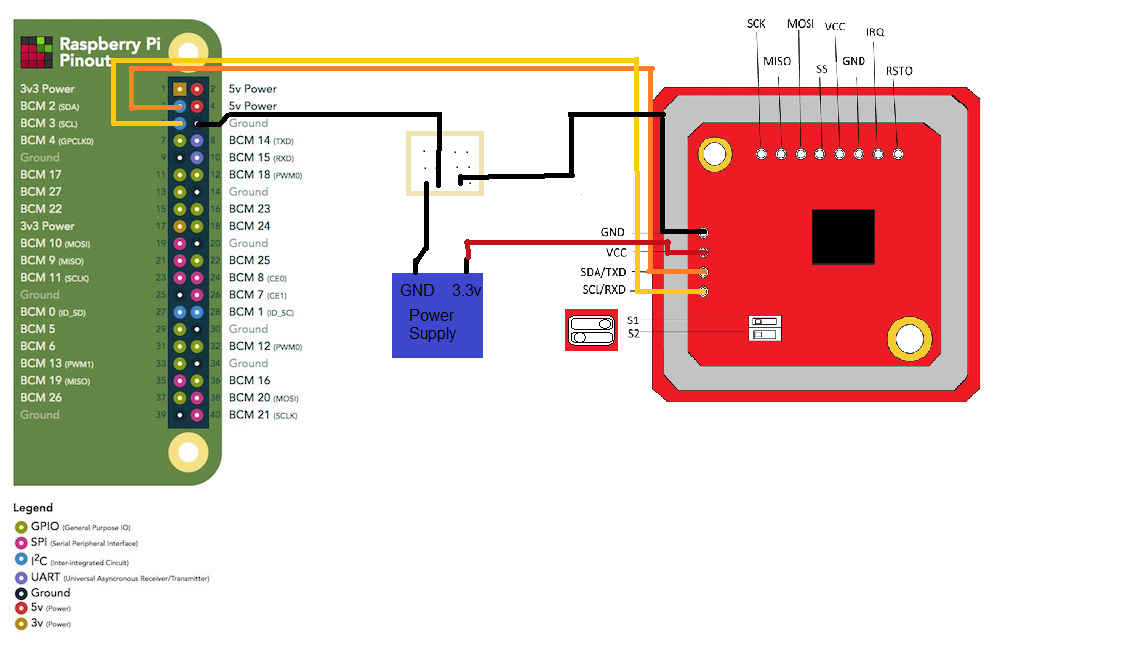This is a port of Seeed Studios's PN532 Arduino Library for using the PN532 chip with Raspberry Pi.
- Support all interfaces of PN532 (I2C, SPI, HSU)
- Read/write Mifare Classic Card
- Communicate with android 4.0+(Lists of devices supported)
- Card emulation (NFC Type 4 tag)
- Works with Don's NDEF Library
- To support more than one INFO PDU of P2P communication
- To read/write NFC Type 4 tag
-
PyPI
- Install with pip
pip install pn532pi - Follow examples
- Install with pip
-
Direct Download
- Download zip file and extract the 4 folders(pn532pi, quick2wire, examples and test)
- Follow the examples of the two libraries.
-
Clone Git Repository
-
Get pn532 library
git clone --recursive https://github.com/gassajor000/pn532pi.git -
Follow the examples of the two libraries
-
The Raspberry Pi 3.3v regulator does not provide enough current to drive the PN532 chip. If you try to run the PN532 off your Raspberry Pi it will reset randomly and may not respond to commands. Instead you will need another power source (3.3v) to power the PN532. Some people have been able to run the PN532 off of the 5V rail of the raspberry pi but this is not the recommended way of powering it.
I2C is short for Inter-integrated Circuit. I2C interface needs only 4 wires to connect PN532 with Raspbeery Pi.

To use the I2C bus 1 to control PN532, refer to the code below.
from pn532pi import Pn532I2c, Pn532
i2c = Pn532I2c(1)
nfc = Pn532(i2c)
def setup():
nfc.begin()
# ...To run an example you will need to change the interface flags to the interface you are using. For SPI you may also have to change the slave select pin to the pin you have connected.
# Set the desired interface to True
SPI = True
I2C = False
HSU = False
...
if SPI:
PN532_SPI = Pn532Spi(Pn532Spi.SS0_GPIO8)
nfc = Pn532(PN532_SPI)Then you can just call python <example file>.py from a terminal.
We are willing to provide debug help for this library however there is currently only one maintainer doing this in his free time. Don't be surprised if responses take a couple days. Also, as hardware issues can be quite difficult to debug remotely, if your issue cannot be replicated using the test setup (pi 3B+) then there may not be much we can do.
For Remote IO Errors (I2C communciation errors) we also require that you take a logic capture
of the i2c failure. This is needed to determine whether the pi or the nfc chip is the cause of the communication failure. Below is a
recommendation for an affordable logic analyzer that can be run with the opensource Pulse View
application or with the Selaea app.
It's based on Adafruit_NFCShield_I2C. Seeed Studio rewrite the library to make it easy to support different interfaces and platforms. @Don writes the NDEF library to make it more easy to use. @JiapengLi adds HSU interface. @awieser adds card emulation function. @gassajor000 ported to python/Raspberry Pi
[Mega]: https://arduino.cc/en/Main/ arduinoBoardMega [DUE]: https://arduino.cc/en/Main/arduinoBoardDue [Leonardo]: https://arduino.cc/en/Main/arduinoBoardLeonardo [SoftwareSerial]: https://www.arduino.cc/en/Reference/softwareSerial
Images courtesy of pinout.xyz, components101.com, sparkfun.com

